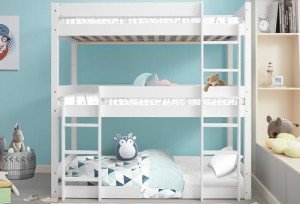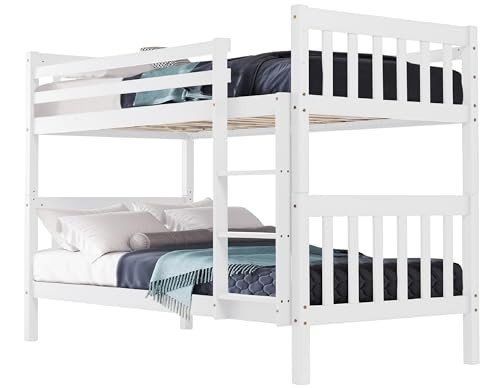adult-bunk-beds8341
adult-bunk-beds8341
From The Web Twenty Amazing Infographics About Bunk Beds
Exploring Bunk Beds: A Comprehensive Guide
Bunk beds have actually long been a staple in children’s bed rooms, dormitories, and even homes with minimal space. Not only do they offer a practical sleeping solution, but they likewise develop an enjoyable and creative environment for children and a great space-saver for adults and households. This post will explore everything you need to learn about bunk beds, from types and products to safety ideas and buying recommendations.
Table of Contents
- Kinds Of Bunk Beds
- Conventional Bunk Beds
- Loft Beds
- Triple Bunk Beds
- L-Shaped Bunk Beds
- Product Options
- Wood
- Metal
- Safety Considerations
- Buying Guide
- Frequently asked questions
Types of Bunk Beds
Bunk beds come in different styles to fit different requirements and preferences. Here’s a breakdown of the most typical types:
Conventional Bunk Beds
Standard bunks typically include 2 beds stacked vertically on top of one another. These beds are perfect for siblings sharing a room or for optimizing sleeping space in guest rooms.
Loft Beds
Loft beds stand likewise to conventional bunk beds but do not have a lower sleeping location. Instead, they typically incorporate a desk or seating location below, making them a great option for little spaces needing multifunctionality.
Triple Bunk Beds
Triple bunk beds are created for three occupants, with beds stacked in a three-tier configuration. These are less common but can be an enjoyable solution for large households or pajama parties.

L-Shaped Bunk Beds
With one bed positioned horizontally and the other vertically, L-shaped bunk beds are frequently equipped with extra functions such as desks or storage drawers and can complement corner spaces in a room.
Comparison of Bunk Bed Types
| Bed Type | Suitable Use | Description |
|---|---|---|
| Traditional | Shared bed rooms or visitor rooms | Two beds stacked vertically |
| Loft | Little spaces needing multi-purpose space | Upper bed with open space beneath |
| Triple | Big families or sleepovers | 3 beds stacked vertically |
| L-Shaped | Corner or versatile spaces | A combination of vertical and horizontal beds |
Material Options
Bunk beds are produced from various products, with wood and metal being the most common. Each material has its pros and cons.
Wood
- Resilience: Generally robust and can endure years of use.
- Visual Appeal: Offers a classic appearance that can blend with different decors.
- Weight Capacity: Typically stronger; can support much heavier weights.
- Downsides: May be more expensive than metal choices and can be prone to scratches.
Metal
- Strength: Generally lightweight and simple to move but still tough.
- Modern Design: Often can be found in sleek styles, making it appealing for contemporary spaces.
- Economical: Usually less costly than wooden alternatives.
- Disadvantages: Can be cold to the touch in winters and might not have the same visual appeal for some buyers.
Safety Considerations
When it pertains to bunk beds, security can not be overlooked. Here are key security pointers to remember:
- Guardrails: Ensure that the top bunk has guardrails on both sides to avoid falls.
- Durable Construction: Check for a strong develop and tough products to hold up against weight and movement.
- Weight Limit: Adhere to the producer’s weight limit for both the upper and lower bunks.
- Ladder Design: Choose bunks (https://www.zorka.top/furniture/rise-and-shine-the-ultimate-guide-to-stylish-and-functional-bunk-beds-for-kids-for-your-space-saving-needs/) with a safe, easy-to-climb ladder and avoid any sharp edges or rungs.
- Age Restrictions: Most producers suggest that children under the age of six ought to not sleep in the upper bunk.
Buying Guide
When looking for bunk beds, consider the following aspects to discover the best suitable for your requirements:
- Space Availability: Measure the room size and ceiling height, ensuring there is appropriate space for the top bunk.
- Bed Size: Decide in between twin, complete, or bigger sizes based on your requirements and the size of the space.
- Style Preference: Consider the total decoration of the bedroom to discover an ideal design.
- Relieve of Setup: Look for a bunk bed that is uncomplicated to put together.
- Budget plan: Bunk beds can be found in numerous rate varieties, so identify a spending plan before beginning your search.
FAQs
1. What is the suggested age for kids to sleep on the top bunk?
Children aged 6 and older are normally suggested to sleep on the top bunk to decrease the danger of falls.

2. How can I make my bunk bed safer?
To enhance security, make sure guardrails are correctly installed and inspect that the bed is positioned on a flat surface area. Additionally, motivate children to utilize the ladder carefully.
3. Can I convert a bunk bed into two different beds?
Numerous bunk beds are designed to be convertible. Examine the producer’s specifications for convertibility functions.
4. What accessories are readily available for bunk beds?
Typical accessories consist of bed linens, storage drawers, staircases rather of ladders, and tented canopies for an enjoyable visual appeal.
5. How do I keep my bunk bed?
Routine look for loose screws or structural integrity can help ensure security. Dust the bed frequently and clean spills without delay to keep the products in good condition.
Bunk beds are versatile and a space-efficient service for numerous living scenarios, from children’s rooms to visitor accommodations. With many styles and materials offered, prospective purchasers have a wealth of options to consider, ensuring a combination of usefulness and looks. By focusing on safety and following the suggestions laid out in this guide, individuals can discover the ideal bunk bed that matches their space and lifestyle, all while creating a pleasurable sleeping environment.


